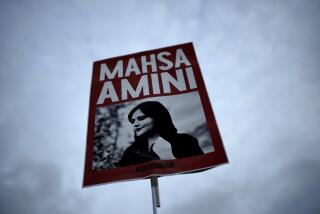Iran closes reformist paper again
- Share via
TEHRAN — Iran’s leading reformist newspaper was temporarily banned again Monday for publishing an interview with an exiled Iranian poet known for her poems explicitly exploring female sexuality.
A Ministry of Culture official characterized the subject of the report, Saghi Ghahraman, 50, as “a counterrevolutionary figure known for promoting immoral issues.”
The order from the Press Review Board was the third time the popular Shargh newspaper had been ordered closed. Newspaper editors said Monday’s closure was part of a widening crackdown on dissent across the country.
“Personally, I have no motivation to care about how long [the closure] is for, because it seems we have no way to keep on working as journalists,” Shargh’s managing director, Mehdi Rahmanian, said as the paper distributed its final issue, which included a prominent, front-page apology for the interview.
“The real issue is they don’t like our methods of journalism. We have a critical approach. They need some yes men. We are not yes men,” Rahmanian said.
“God knows” what will happen to the paper’s 400 employees, he added.
An inside page of Saturday’s paper carried the interview with Ghahraman, who fled Iran in 1981 after the Islamic Revolution and eventually settled in Canada, where she published a series of books of poetry and short fiction, including “Of Lies” and “The Whore Gives Life.”
Hard-line critics in Iran accused Ghahraman of advocating for homosexuality and “immorality.” In many interviews, Ghahraman argues against locking writers into gender expectations that are particularly confining for women in traditional societies.
“My guess is that because I don’t live within the traditional framework of womanhood, spontaneously there is no such border in my poems,” she told Shargh in Saturday’s publication. “Our problem is how to understand that it is inevitable that the border between men and women is doomed to be dissolved.”
Her poems, which were only briefly quoted in the interview, often contain graphic descriptions of female physiology and sexuality. In one, a girl makes love to her invalid grandmother.
One of the most prominent mouthpieces of Iran’s hard-line government, Kayhan, a daily newspaper that is frequently critical of moderate publications, accused Ghahraman of being “a member of the CIA” whose work promotes “sexual ... and intellectual promiscuity” and who harbors a “hostile political approach toward the Iranian regime.”
Shargh was shut down briefly by the government in February 2004 and was closed again last fall after publishing a cartoon deemed critical of Iranian President Mahmoud Ahmadinejad. It had reopened in March.
Shargh carried the first of two apologies Sunday, the day after the interview appeared, in response to what it said were complaints from readers.
“Some of the cultivated readers of Shargh daily had contact with the newspaper and complained that the interviewee had no proper moral character; they ... asked us to have more conscience in these sorts of terms. We now apologize to our readers and we categorically disavow ourselves from such people or the groups connected to them,” the paper wrote.
On Monday, the paper ran a similar apology, moving it up to the top of the front page, to no avail. The Press Review Board ordered a temporary closure, the duration of which is to be determined by the courts.
Ali Reza Malekian, an official with the Ministry of Culture, told the Islamic Republic News Agency that the interview with “an anti-revolutionary figure, who is famous for promoting anti-morality materials, is the main reason behind the closure of the paper.”
More than 100 Iranian newspapers have been shut down over the last several years. Journalists have been sentenced to prison for offenses that included “propaganda against the regime” and “insulting” Iran’s supreme religious leader.
Reporters Without Borders filed a formal protest last month against death sentences handed out in northwest Iran to two ethnic Kurd journalists and activists, one of whom was found guilty of spying and “activities subverting national security.”
The Iranian government claims the Kurdish men were not journalists. A government spokesman said this week that their fate would be decided in the courts.
Another leading reformist daily, Hammihan, was ordered closed in early July, two months after it had resumed publication after a seven-year suspension. The moderate Iranian Labor News Agency also was shut down by the government last month.
More to Read
Sign up for Essential California
The most important California stories and recommendations in your inbox every morning.
You may occasionally receive promotional content from the Los Angeles Times.












